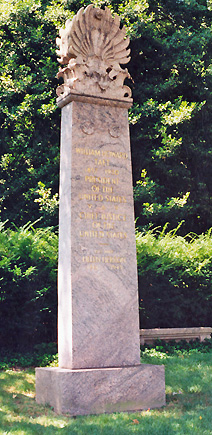In 1904, Taft was appointed Secretary of War by President Teddy Roosevelt, and by 1907 had decided that Taft should be his successor. The Republican Convention nominated him the next year.
Taft disliked the campaign--"one of the most uncomfortable four months of my life." But he pledged his loyalty to the Roosevelt program, popular in the West, while his brother Charles reassured eastern Republicans. William Jennings Bryan, running on the Democratic ticket for a third time, complained that he was having to oppose two candidates, a western progressive Taft and an eastern conservative Taft. Taft won the presidential election.
 Progressives were pleased with
Taft's election. "Roosevelt has cut enough hay," they said; "Taft is
the
man to put it into the barn." Conservatives were delighted to be rid of
Roosevelt--the "mad messiah." However, Taft was not a successful
President.
Unlike Roosevelt, Taft did not believe in the stretching of
Presidential
powers. Taft alienated many liberal Republicans who later formed
the Progressive Party, by defending the Payne-Aldrich Act which
unexpectedly
continued high tariff rates. He further antagonized Progressives by
upholding
his Secretary of the Interior, accused of failing to carry out
Roosevelt's
conservation policies.
Progressives were pleased with
Taft's election. "Roosevelt has cut enough hay," they said; "Taft is
the
man to put it into the barn." Conservatives were delighted to be rid of
Roosevelt--the "mad messiah." However, Taft was not a successful
President.
Unlike Roosevelt, Taft did not believe in the stretching of
Presidential
powers. Taft alienated many liberal Republicans who later formed
the Progressive Party, by defending the Payne-Aldrich Act which
unexpectedly
continued high tariff rates. He further antagonized Progressives by
upholding
his Secretary of the Interior, accused of failing to carry out
Roosevelt's
conservation policies.
In the angry Progressive onslaught against him, little attention was paid to the fact that his administration initiated 80 antitrust suits and that Congress submitted to the states amendments for a Federal income tax and the direct election of Senators. A postal savings system was established, and the Interstate Commerce Commission was directed to set railroad rates.
Teddy Roosevelt was so frustrated with Taft's leadership that he ran for President in 1912 on the Bull Moose ticket, which allowed the Democrat Woodrow Wilson to win with a plurality of the popular vote (but a majority of the electoral vote).
After his defeat in 1912, Taft returned to his alma mater, Yale, to teach law. In 1921, the Republicans once again occupied the White House. President Harding nominated Taft to the position of Chief Justice after the death of Edward White, whom Taft had appointed to that position. The Senate confirmed Taft's nomination the same day it was sent to it. Taft thus became the only person to serve as both President and as a Justice of the Supreme Court. (John Quincy Adams declined a nomination to the Court before he became President in 1825.)
Taft was a conservative judge who distrusted reform legislation that he believed too radical. In Truax v. Corrigan in 1921, Taft wrote the Court's opinion declaring Arizona's efforts to limit the issuance of much despised injunctions by judges (used against labor unions) during a labor strike to be unconstitutional. Taft saw the legislation as being too heavy in favor of labor. Taft also wrote an opinion for the Court declaring unconstitutional a congressional effort to outlaw child labor through use of the taxing power. Taft did dissent in Adkins v. Children's Hospital in 1923, which held unconstitutional a minimum wage law for women in the District of Columbia. Taft was an able judicial administrator, whose lobbying led to the passage of the Judiciary Act of 1925. This Act granted to the Court an extraordinary discretion in its caseload.
Taft resigned from the Court
due to illness in February of 1930. He died a month later. Taft never
liked
being president and always considered being a Supreme Court
Justice
as being the highpoint of his life. He once said, "I don't
remember
that I ever was President."